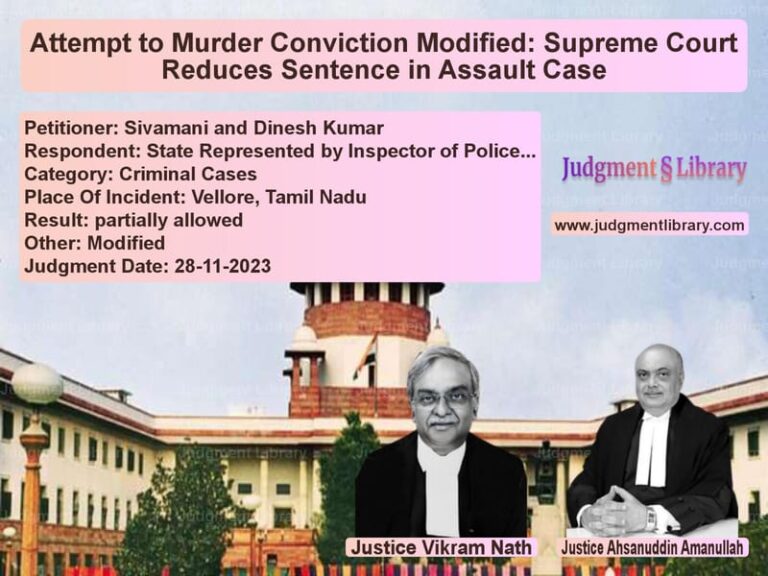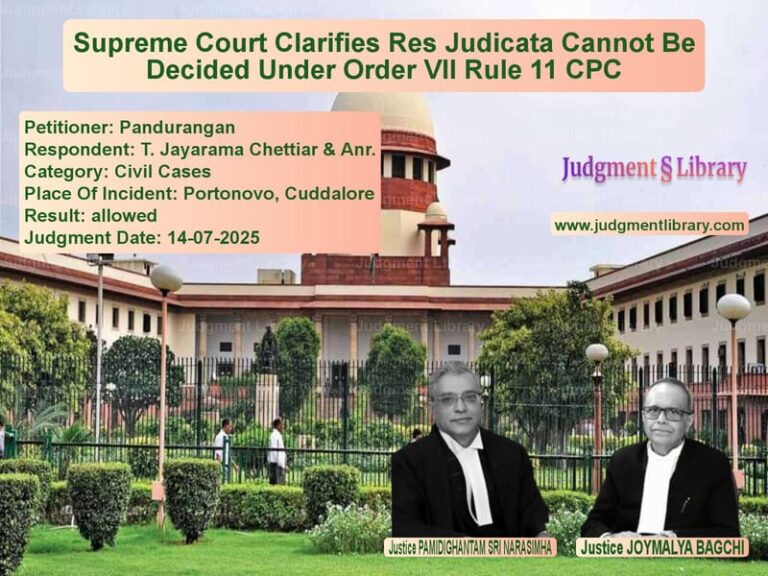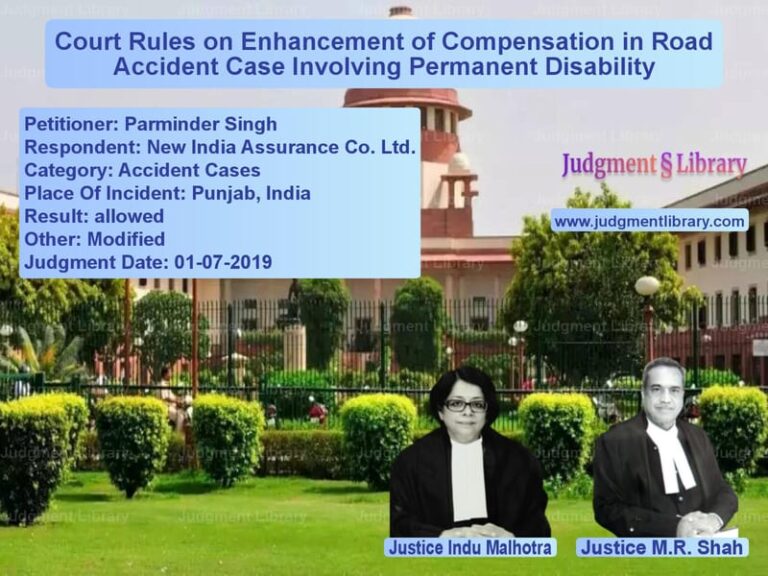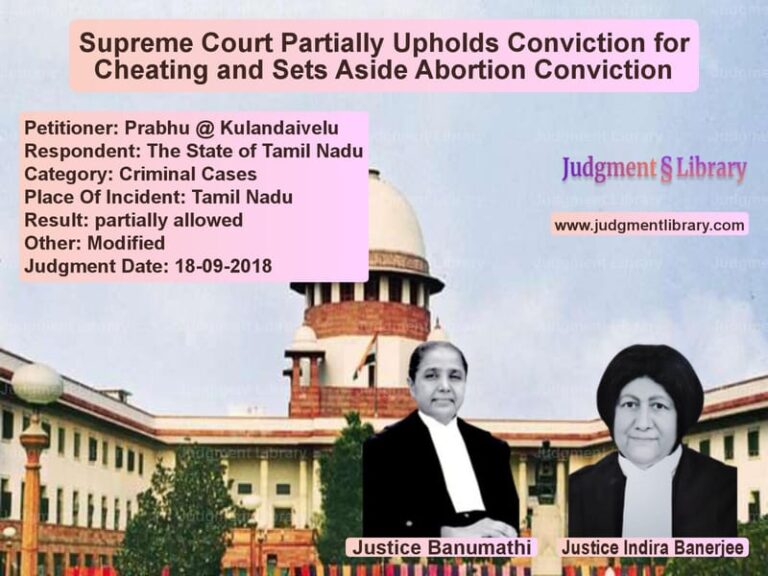Forgery Allegations and Anticipatory Bail: Supreme Court’s Ruling on Sasikala Pushpa Case
The case of Sasikala Pushpa & Others vs. State of Tamil Nadu revolves around a series of legal battles involving forgery allegations and anticipatory bail. The Supreme Court was called upon to adjudicate whether the Madurai Bench of the Madras High Court was justified in directing the lodging of a criminal complaint against the appellants over an alleged forged vakalatnama (legal authorization document). The case also examined anticipatory bail petitions related to multiple criminal cases.
The ruling provided clarity on the principles governing criminal contempt, the procedural safeguards under Section 340 Cr.P.C., and the standards for granting anticipatory bail in cases involving allegations of political vendetta.
Background of the Case
The first appellant, Sasikala Pushpa, was a Member of Parliament (Rajya Sabha) and an expelled member of the All India Anna Dravida Munnetra Kazhagam (AIADMK). The controversy arose from a complaint filed by Banumathi, a domestic worker employed at the residence of the appellants in 2011. The complaint alleged sexual harassment and led to the registration of Crime No.5/2016 at the All Women’s Police Station under Sections 294(b), 323, 344, 354(A), and 506(i) of the Indian Penal Code (IPC), along with Section 4 of the Tamil Nadu Prohibition of Harassment of Women Act, 2002.
Fearing arrest, the appellants moved an anticipatory bail application before the Madurai Bench of the Madras High Court. However, the High Court raised concerns over the authenticity of the vakalatnama submitted by the appellants, alleging that it contained forged signatures. The High Court, instead of granting bail, ordered the Registrar (Judicial) to lodge a complaint against the appellants, leading to the registration of Crime No.1331/2016 under Sections 193, 466, 468, and 471 IPC.
Legal Issues Considered
- Whether the High Court was justified in ordering the filing of a criminal complaint against the appellants.
- Whether the vakalatnama submitted by the appellants amounted to forgery.
- Whether anticipatory bail should be granted in Crime No.5/2016 and Crime No.276/2016.
- Whether political vendetta played a role in the allegations against the appellants.
Arguments by the Petitioner (Sasikala Pushpa & Others)
- The vakalatnama contained the signatures of the appellants, but an incorrect date and place were mentioned due to clerical error.
- The High Court did not record a finding that it was “expedient in the interest of justice” to initiate criminal proceedings, which is a mandatory requirement under Section 340 Cr.P.C.
- The criminal cases against the appellants, including the sexual harassment case, were politically motivated.
- The alleged offenses were not serious enough to warrant the denial of anticipatory bail.
Arguments by the Respondent (State of Tamil Nadu)
- The High Court rightly found that the vakalatnama contained forged signatures, which amounted to fraud upon the court.
- Appellant No.1, Sasikala Pushpa, left for Singapore on 17.08.2016, but the vakalatnama indicated she had signed the document in Madurai on 18.08.2016.
- The appellants were not cooperating with the investigation, and anticipatory bail should not be granted.
Supreme Court’s Observations
The Supreme Court held that the High Court was not justified in directing the filing of a criminal complaint against the appellants without recording a clear finding that such a step was “expedient in the interest of justice.” The Court observed:
“The language in Section 340 Cr.P.C. shows that such a course will be adopted only if the interest of justice requires and not in every case.”
Further, the Court noted:
“A vakalatnama is merely an authorization document for an advocate to appear in court. An incorrect date or place mentioned in it does not amount to forgery unless there is an intention to deceive.”
Key Findings of the Supreme Court
- The High Court’s order directing the lodging of a criminal complaint was set aside as it did not meet the legal standards under Section 340 Cr.P.C.
- The Supreme Court quashed FIR No.1331/2016 and the charge sheet filed against the appellants.
- The Court extended interim protection from arrest in Crime No.5/2016 and Crime No.276/2016.
- The first appellant was granted anticipatory bail in Crime No.276/2016.
- The Court noted that the appellants could move the High Court for quashing Crime No.276/2016.
Final Verdict
The Supreme Court allowed the appeals and quashed the criminal proceedings related to the vakalatnama. It extended anticipatory bail protections for the appellants in other cases, ensuring they were not subjected to undue legal harassment.
Implications of the Judgment
This ruling reinforces the principle that criminal contempt proceedings under Section 340 Cr.P.C. must be exercised with caution. It also highlights that procedural lapses, such as clerical errors in vakalatnamas, should not automatically lead to criminal prosecution.
The judgment serves as a safeguard against politically motivated legal actions and ensures that anticipatory bail remains a viable remedy in cases where allegations are questionable.
Petitioner Name: Sasikala Pushpa & Others.Respondent Name: State of Tamil Nadu.Judgment By: Justice R. Banumathi, Justice S. Abdul Nazeer.Place Of Incident: Tamil Nadu.Judgment Date: 07-05-2019.
Don’t miss out on the full details! Download the complete judgment in PDF format below and gain valuable insights instantly!
Download Judgment: Sasikala Pushpa & Ot vs State of Tamil Nadu Supreme Court of India Judgment Dated 07-05-2019.pdf
Direct Downlaod Judgment: Direct downlaod this Judgment
See all petitions in Fraud and Forgery
See all petitions in Bail and Anticipatory Bail
See all petitions in Judgment by R. Banumathi
See all petitions in Judgment by S. Abdul Nazeer
See all petitions in partially allowed
See all petitions in Quashed
See all petitions in supreme court of India judgments May 2019
See all petitions in 2019 judgments
See all posts in Criminal Cases Category
See all allowed petitions in Criminal Cases Category
See all Dismissed petitions in Criminal Cases Category
See all partially allowed petitions in Criminal Cases Category







